Nursing Ethics: Analyzing Ethical and Legal Principles in Practice
VerifiedAdded on 2022/11/10
|7
|1791
|2
Report
AI Summary
This report analyzes a nursing ethics case study involving a registered nurse (RN) named Sam facing ethical dilemmas related to a 15-year-old patient, Jessica, who is pregnant and does not want her mother to know. The report identifies key ethical issues, including patient confidentiality, beneficence, and non-maleficence, and explores relevant legal and ethical principles. It references the ICN Code of Ethics for Nurses and discusses different approaches to address the ethical challenges. The report details the application of confidentiality clauses, the role of parental consent, and the nurse's responsibility to advocate for the patient's well-being. The author, in the role of the RN, explains the decision to prioritize communication and education, emphasizing the importance of family support and safe sex practices. The report concludes by highlighting the significance of a holistic approach to treatment and the importance of considering the patient's health and well-being above strict adherence to confidentiality in this specific case.
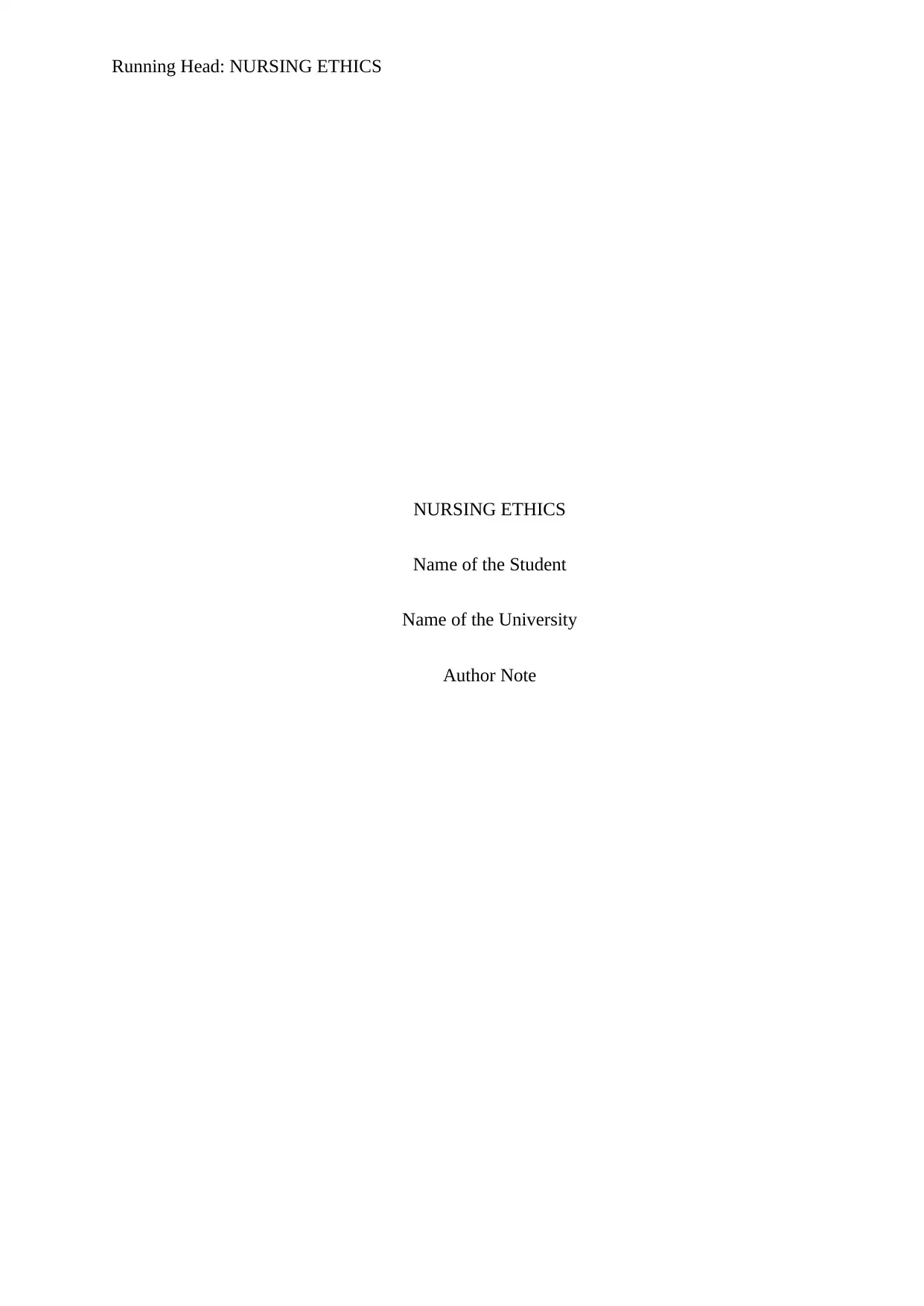
Running Head: NURSING ETHICS
NURSING ETHICS
Name of the Student
Name of the University
Author Note
NURSING ETHICS
Name of the Student
Name of the University
Author Note
Paraphrase This Document
Need a fresh take? Get an instant paraphrase of this document with our AI Paraphraser
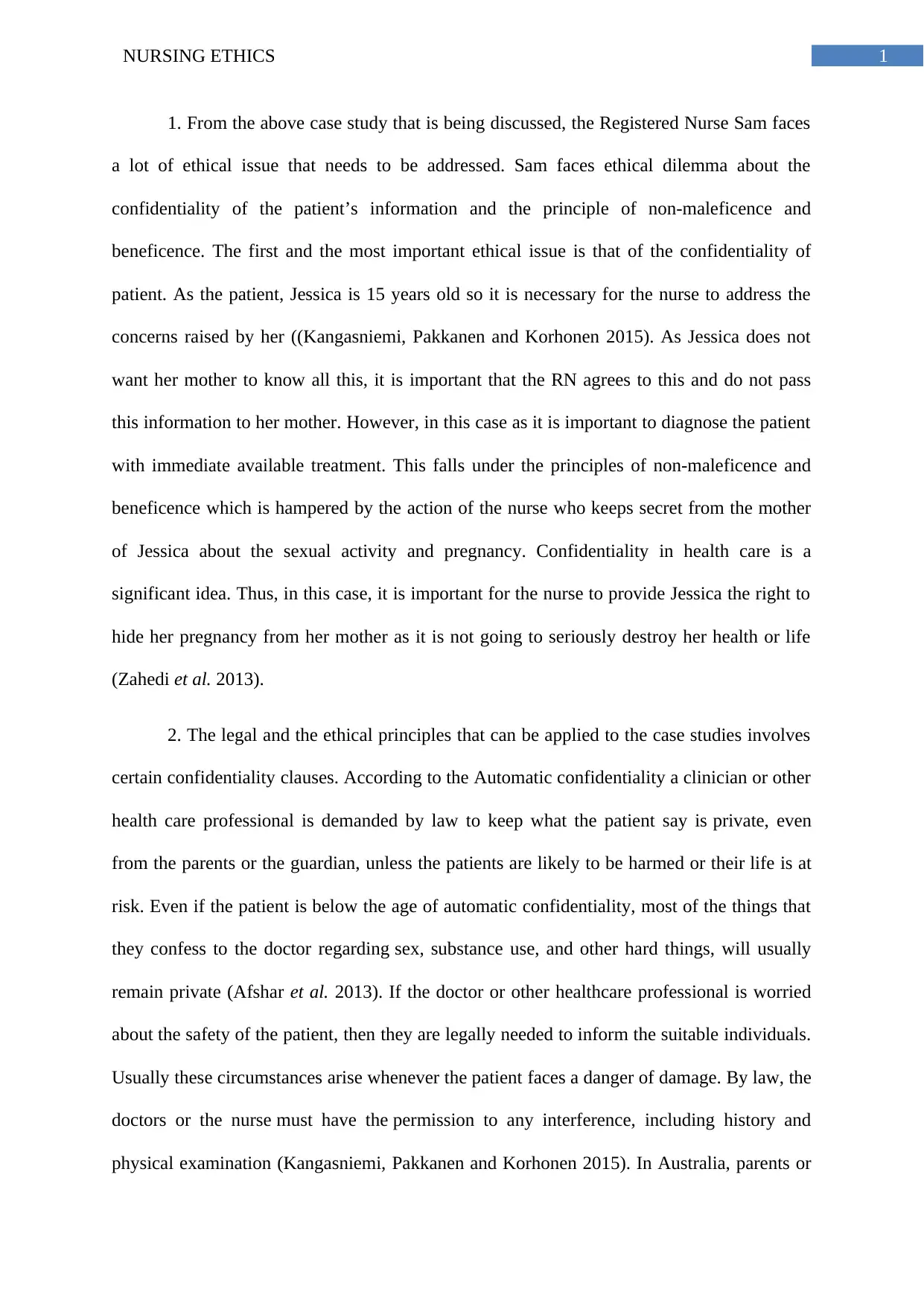
1NURSING ETHICS
1. From the above case study that is being discussed, the Registered Nurse Sam faces
a lot of ethical issue that needs to be addressed. Sam faces ethical dilemma about the
confidentiality of the patient’s information and the principle of non-maleficence and
beneficence. The first and the most important ethical issue is that of the confidentiality of
patient. As the patient, Jessica is 15 years old so it is necessary for the nurse to address the
concerns raised by her ((Kangasniemi, Pakkanen and Korhonen 2015). As Jessica does not
want her mother to know all this, it is important that the RN agrees to this and do not pass
this information to her mother. However, in this case as it is important to diagnose the patient
with immediate available treatment. This falls under the principles of non-maleficence and
beneficence which is hampered by the action of the nurse who keeps secret from the mother
of Jessica about the sexual activity and pregnancy. Confidentiality in health care is a
significant idea. Thus, in this case, it is important for the nurse to provide Jessica the right to
hide her pregnancy from her mother as it is not going to seriously destroy her health or life
(Zahedi et al. 2013).
2. The legal and the ethical principles that can be applied to the case studies involves
certain confidentiality clauses. According to the Automatic confidentiality a clinician or other
health care professional is demanded by law to keep what the patient say is private, even
from the parents or the guardian, unless the patients are likely to be harmed or their life is at
risk. Even if the patient is below the age of automatic confidentiality, most of the things that
they confess to the doctor regarding sex, substance use, and other hard things, will usually
remain private (Afshar et al. 2013). If the doctor or other healthcare professional is worried
about the safety of the patient, then they are legally needed to inform the suitable individuals.
Usually these circumstances arise whenever the patient faces a danger of damage. By law, the
doctors or the nurse must have the permission to any interference, including history and
physical examination (Kangasniemi, Pakkanen and Korhonen 2015). In Australia, parents or
1. From the above case study that is being discussed, the Registered Nurse Sam faces
a lot of ethical issue that needs to be addressed. Sam faces ethical dilemma about the
confidentiality of the patient’s information and the principle of non-maleficence and
beneficence. The first and the most important ethical issue is that of the confidentiality of
patient. As the patient, Jessica is 15 years old so it is necessary for the nurse to address the
concerns raised by her ((Kangasniemi, Pakkanen and Korhonen 2015). As Jessica does not
want her mother to know all this, it is important that the RN agrees to this and do not pass
this information to her mother. However, in this case as it is important to diagnose the patient
with immediate available treatment. This falls under the principles of non-maleficence and
beneficence which is hampered by the action of the nurse who keeps secret from the mother
of Jessica about the sexual activity and pregnancy. Confidentiality in health care is a
significant idea. Thus, in this case, it is important for the nurse to provide Jessica the right to
hide her pregnancy from her mother as it is not going to seriously destroy her health or life
(Zahedi et al. 2013).
2. The legal and the ethical principles that can be applied to the case studies involves
certain confidentiality clauses. According to the Automatic confidentiality a clinician or other
health care professional is demanded by law to keep what the patient say is private, even
from the parents or the guardian, unless the patients are likely to be harmed or their life is at
risk. Even if the patient is below the age of automatic confidentiality, most of the things that
they confess to the doctor regarding sex, substance use, and other hard things, will usually
remain private (Afshar et al. 2013). If the doctor or other healthcare professional is worried
about the safety of the patient, then they are legally needed to inform the suitable individuals.
Usually these circumstances arise whenever the patient faces a danger of damage. By law, the
doctors or the nurse must have the permission to any interference, including history and
physical examination (Kangasniemi, Pakkanen and Korhonen 2015). In Australia, parents or
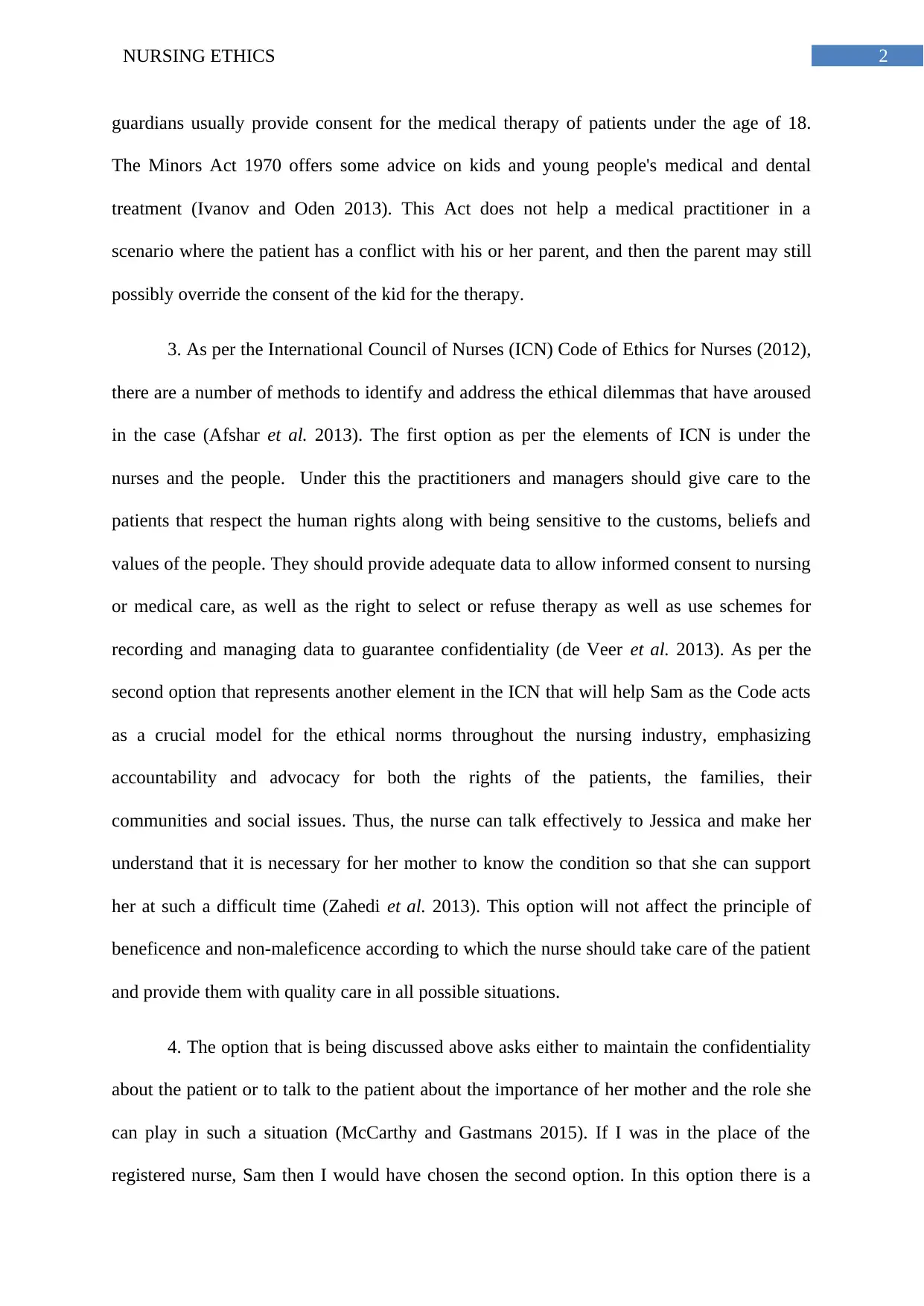
2NURSING ETHICS
guardians usually provide consent for the medical therapy of patients under the age of 18.
The Minors Act 1970 offers some advice on kids and young people's medical and dental
treatment (Ivanov and Oden 2013). This Act does not help a medical practitioner in a
scenario where the patient has a conflict with his or her parent, and then the parent may still
possibly override the consent of the kid for the therapy.
3. As per the International Council of Nurses (ICN) Code of Ethics for Nurses (2012),
there are a number of methods to identify and address the ethical dilemmas that have aroused
in the case (Afshar et al. 2013). The first option as per the elements of ICN is under the
nurses and the people. Under this the practitioners and managers should give care to the
patients that respect the human rights along with being sensitive to the customs, beliefs and
values of the people. They should provide adequate data to allow informed consent to nursing
or medical care, as well as the right to select or refuse therapy as well as use schemes for
recording and managing data to guarantee confidentiality (de Veer et al. 2013). As per the
second option that represents another element in the ICN that will help Sam as the Code acts
as a crucial model for the ethical norms throughout the nursing industry, emphasizing
accountability and advocacy for both the rights of the patients, the families, their
communities and social issues. Thus, the nurse can talk effectively to Jessica and make her
understand that it is necessary for her mother to know the condition so that she can support
her at such a difficult time (Zahedi et al. 2013). This option will not affect the principle of
beneficence and non-maleficence according to which the nurse should take care of the patient
and provide them with quality care in all possible situations.
4. The option that is being discussed above asks either to maintain the confidentiality
about the patient or to talk to the patient about the importance of her mother and the role she
can play in such a situation (McCarthy and Gastmans 2015). If I was in the place of the
registered nurse, Sam then I would have chosen the second option. In this option there is a
guardians usually provide consent for the medical therapy of patients under the age of 18.
The Minors Act 1970 offers some advice on kids and young people's medical and dental
treatment (Ivanov and Oden 2013). This Act does not help a medical practitioner in a
scenario where the patient has a conflict with his or her parent, and then the parent may still
possibly override the consent of the kid for the therapy.
3. As per the International Council of Nurses (ICN) Code of Ethics for Nurses (2012),
there are a number of methods to identify and address the ethical dilemmas that have aroused
in the case (Afshar et al. 2013). The first option as per the elements of ICN is under the
nurses and the people. Under this the practitioners and managers should give care to the
patients that respect the human rights along with being sensitive to the customs, beliefs and
values of the people. They should provide adequate data to allow informed consent to nursing
or medical care, as well as the right to select or refuse therapy as well as use schemes for
recording and managing data to guarantee confidentiality (de Veer et al. 2013). As per the
second option that represents another element in the ICN that will help Sam as the Code acts
as a crucial model for the ethical norms throughout the nursing industry, emphasizing
accountability and advocacy for both the rights of the patients, the families, their
communities and social issues. Thus, the nurse can talk effectively to Jessica and make her
understand that it is necessary for her mother to know the condition so that she can support
her at such a difficult time (Zahedi et al. 2013). This option will not affect the principle of
beneficence and non-maleficence according to which the nurse should take care of the patient
and provide them with quality care in all possible situations.
4. The option that is being discussed above asks either to maintain the confidentiality
about the patient or to talk to the patient about the importance of her mother and the role she
can play in such a situation (McCarthy and Gastmans 2015). If I was in the place of the
registered nurse, Sam then I would have chosen the second option. In this option there is a
⊘ This is a preview!⊘
Do you want full access?
Subscribe today to unlock all pages.

Trusted by 1+ million students worldwide
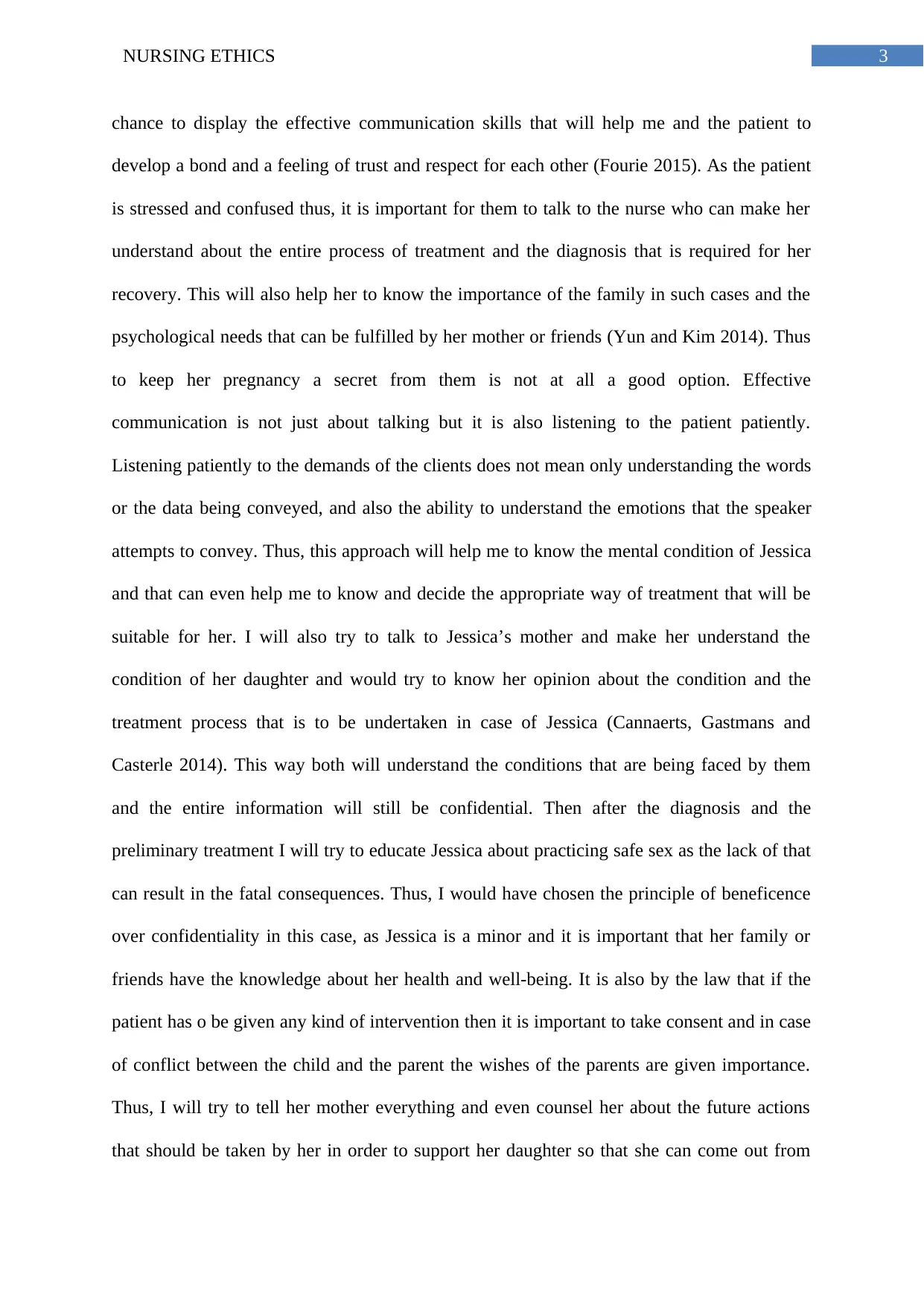
3NURSING ETHICS
chance to display the effective communication skills that will help me and the patient to
develop a bond and a feeling of trust and respect for each other (Fourie 2015). As the patient
is stressed and confused thus, it is important for them to talk to the nurse who can make her
understand about the entire process of treatment and the diagnosis that is required for her
recovery. This will also help her to know the importance of the family in such cases and the
psychological needs that can be fulfilled by her mother or friends (Yun and Kim 2014). Thus
to keep her pregnancy a secret from them is not at all a good option. Effective
communication is not just about talking but it is also listening to the patient patiently.
Listening patiently to the demands of the clients does not mean only understanding the words
or the data being conveyed, and also the ability to understand the emotions that the speaker
attempts to convey. Thus, this approach will help me to know the mental condition of Jessica
and that can even help me to know and decide the appropriate way of treatment that will be
suitable for her. I will also try to talk to Jessica’s mother and make her understand the
condition of her daughter and would try to know her opinion about the condition and the
treatment process that is to be undertaken in case of Jessica (Cannaerts, Gastmans and
Casterle 2014). This way both will understand the conditions that are being faced by them
and the entire information will still be confidential. Then after the diagnosis and the
preliminary treatment I will try to educate Jessica about practicing safe sex as the lack of that
can result in the fatal consequences. Thus, I would have chosen the principle of beneficence
over confidentiality in this case, as Jessica is a minor and it is important that her family or
friends have the knowledge about her health and well-being. It is also by the law that if the
patient has o be given any kind of intervention then it is important to take consent and in case
of conflict between the child and the parent the wishes of the parents are given importance.
Thus, I will try to tell her mother everything and even counsel her about the future actions
that should be taken by her in order to support her daughter so that she can come out from
chance to display the effective communication skills that will help me and the patient to
develop a bond and a feeling of trust and respect for each other (Fourie 2015). As the patient
is stressed and confused thus, it is important for them to talk to the nurse who can make her
understand about the entire process of treatment and the diagnosis that is required for her
recovery. This will also help her to know the importance of the family in such cases and the
psychological needs that can be fulfilled by her mother or friends (Yun and Kim 2014). Thus
to keep her pregnancy a secret from them is not at all a good option. Effective
communication is not just about talking but it is also listening to the patient patiently.
Listening patiently to the demands of the clients does not mean only understanding the words
or the data being conveyed, and also the ability to understand the emotions that the speaker
attempts to convey. Thus, this approach will help me to know the mental condition of Jessica
and that can even help me to know and decide the appropriate way of treatment that will be
suitable for her. I will also try to talk to Jessica’s mother and make her understand the
condition of her daughter and would try to know her opinion about the condition and the
treatment process that is to be undertaken in case of Jessica (Cannaerts, Gastmans and
Casterle 2014). This way both will understand the conditions that are being faced by them
and the entire information will still be confidential. Then after the diagnosis and the
preliminary treatment I will try to educate Jessica about practicing safe sex as the lack of that
can result in the fatal consequences. Thus, I would have chosen the principle of beneficence
over confidentiality in this case, as Jessica is a minor and it is important that her family or
friends have the knowledge about her health and well-being. It is also by the law that if the
patient has o be given any kind of intervention then it is important to take consent and in case
of conflict between the child and the parent the wishes of the parents are given importance.
Thus, I will try to tell her mother everything and even counsel her about the future actions
that should be taken by her in order to support her daughter so that she can come out from
Paraphrase This Document
Need a fresh take? Get an instant paraphrase of this document with our AI Paraphraser
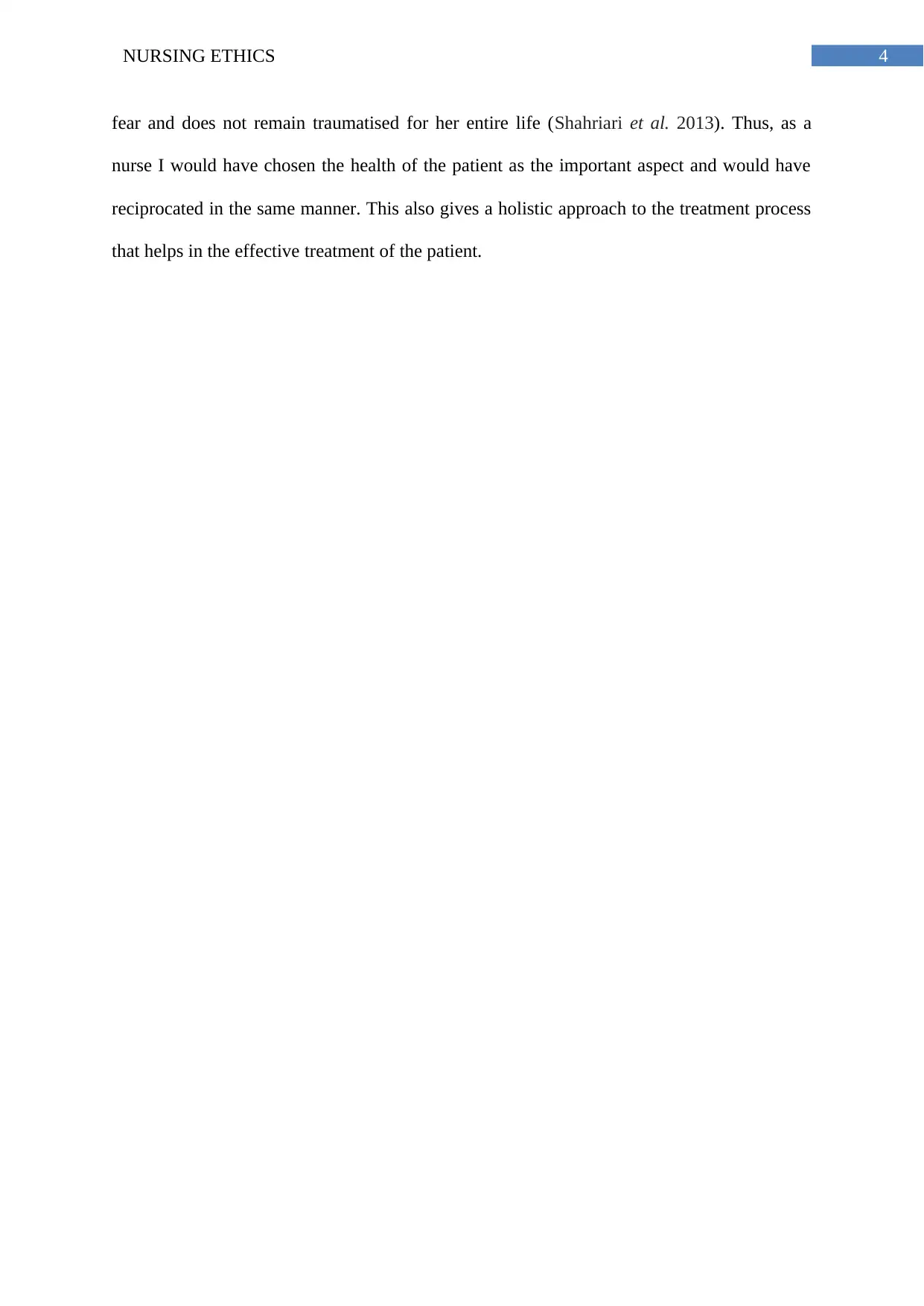
4NURSING ETHICS
fear and does not remain traumatised for her entire life (Shahriari et al. 2013). Thus, as a
nurse I would have chosen the health of the patient as the important aspect and would have
reciprocated in the same manner. This also gives a holistic approach to the treatment process
that helps in the effective treatment of the patient.
fear and does not remain traumatised for her entire life (Shahriari et al. 2013). Thus, as a
nurse I would have chosen the health of the patient as the important aspect and would have
reciprocated in the same manner. This also gives a holistic approach to the treatment process
that helps in the effective treatment of the patient.
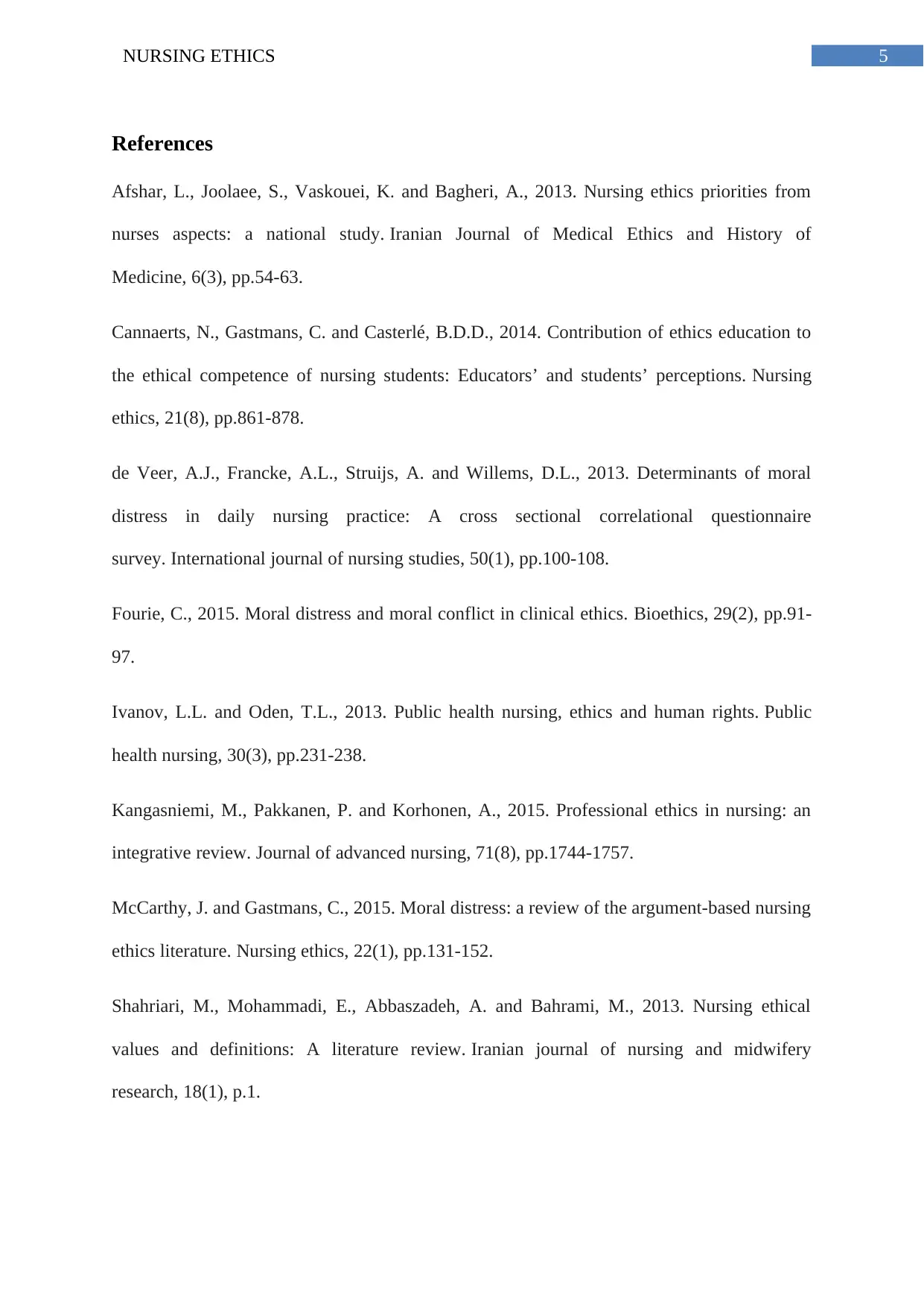
5NURSING ETHICS
References
Afshar, L., Joolaee, S., Vaskouei, K. and Bagheri, A., 2013. Nursing ethics priorities from
nurses aspects: a national study. Iranian Journal of Medical Ethics and History of
Medicine, 6(3), pp.54-63.
Cannaerts, N., Gastmans, C. and Casterlé, B.D.D., 2014. Contribution of ethics education to
the ethical competence of nursing students: Educators’ and students’ perceptions. Nursing
ethics, 21(8), pp.861-878.
de Veer, A.J., Francke, A.L., Struijs, A. and Willems, D.L., 2013. Determinants of moral
distress in daily nursing practice: A cross sectional correlational questionnaire
survey. International journal of nursing studies, 50(1), pp.100-108.
Fourie, C., 2015. Moral distress and moral conflict in clinical ethics. Bioethics, 29(2), pp.91-
97.
Ivanov, L.L. and Oden, T.L., 2013. Public health nursing, ethics and human rights. Public
health nursing, 30(3), pp.231-238.
Kangasniemi, M., Pakkanen, P. and Korhonen, A., 2015. Professional ethics in nursing: an
integrative review. Journal of advanced nursing, 71(8), pp.1744-1757.
McCarthy, J. and Gastmans, C., 2015. Moral distress: a review of the argument-based nursing
ethics literature. Nursing ethics, 22(1), pp.131-152.
Shahriari, M., Mohammadi, E., Abbaszadeh, A. and Bahrami, M., 2013. Nursing ethical
values and definitions: A literature review. Iranian journal of nursing and midwifery
research, 18(1), p.1.
References
Afshar, L., Joolaee, S., Vaskouei, K. and Bagheri, A., 2013. Nursing ethics priorities from
nurses aspects: a national study. Iranian Journal of Medical Ethics and History of
Medicine, 6(3), pp.54-63.
Cannaerts, N., Gastmans, C. and Casterlé, B.D.D., 2014. Contribution of ethics education to
the ethical competence of nursing students: Educators’ and students’ perceptions. Nursing
ethics, 21(8), pp.861-878.
de Veer, A.J., Francke, A.L., Struijs, A. and Willems, D.L., 2013. Determinants of moral
distress in daily nursing practice: A cross sectional correlational questionnaire
survey. International journal of nursing studies, 50(1), pp.100-108.
Fourie, C., 2015. Moral distress and moral conflict in clinical ethics. Bioethics, 29(2), pp.91-
97.
Ivanov, L.L. and Oden, T.L., 2013. Public health nursing, ethics and human rights. Public
health nursing, 30(3), pp.231-238.
Kangasniemi, M., Pakkanen, P. and Korhonen, A., 2015. Professional ethics in nursing: an
integrative review. Journal of advanced nursing, 71(8), pp.1744-1757.
McCarthy, J. and Gastmans, C., 2015. Moral distress: a review of the argument-based nursing
ethics literature. Nursing ethics, 22(1), pp.131-152.
Shahriari, M., Mohammadi, E., Abbaszadeh, A. and Bahrami, M., 2013. Nursing ethical
values and definitions: A literature review. Iranian journal of nursing and midwifery
research, 18(1), p.1.
⊘ This is a preview!⊘
Do you want full access?
Subscribe today to unlock all pages.

Trusted by 1+ million students worldwide
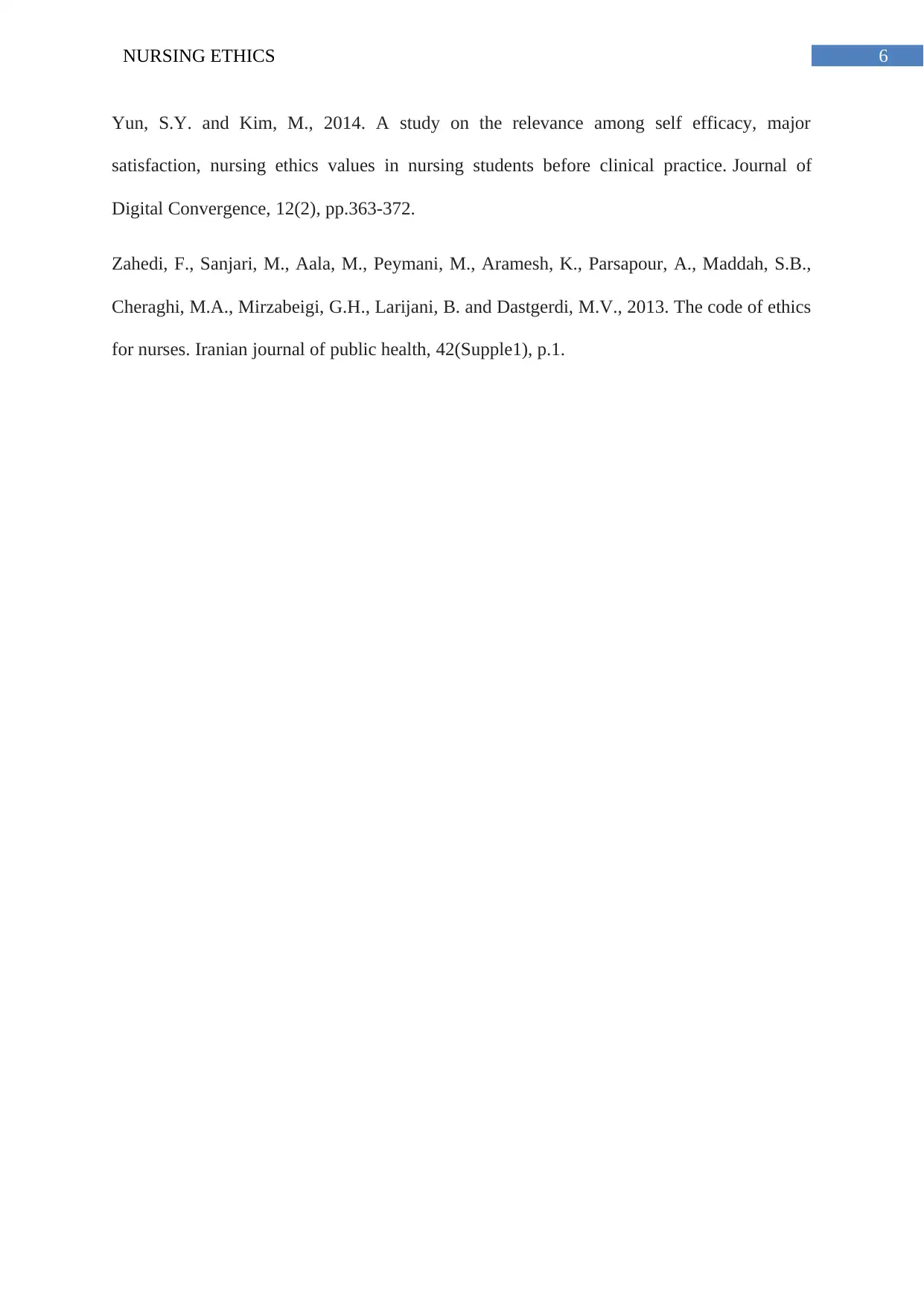
6NURSING ETHICS
Yun, S.Y. and Kim, M., 2014. A study on the relevance among self efficacy, major
satisfaction, nursing ethics values in nursing students before clinical practice. Journal of
Digital Convergence, 12(2), pp.363-372.
Zahedi, F., Sanjari, M., Aala, M., Peymani, M., Aramesh, K., Parsapour, A., Maddah, S.B.,
Cheraghi, M.A., Mirzabeigi, G.H., Larijani, B. and Dastgerdi, M.V., 2013. The code of ethics
for nurses. Iranian journal of public health, 42(Supple1), p.1.
Yun, S.Y. and Kim, M., 2014. A study on the relevance among self efficacy, major
satisfaction, nursing ethics values in nursing students before clinical practice. Journal of
Digital Convergence, 12(2), pp.363-372.
Zahedi, F., Sanjari, M., Aala, M., Peymani, M., Aramesh, K., Parsapour, A., Maddah, S.B.,
Cheraghi, M.A., Mirzabeigi, G.H., Larijani, B. and Dastgerdi, M.V., 2013. The code of ethics
for nurses. Iranian journal of public health, 42(Supple1), p.1.
1 out of 7
Related Documents
Your All-in-One AI-Powered Toolkit for Academic Success.
+13062052269
info@desklib.com
Available 24*7 on WhatsApp / Email
![[object Object]](/_next/static/media/star-bottom.7253800d.svg)
Unlock your academic potential
Copyright © 2020–2026 A2Z Services. All Rights Reserved. Developed and managed by ZUCOL.




